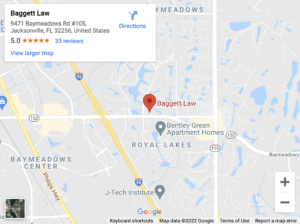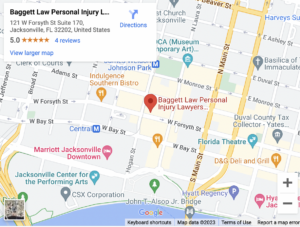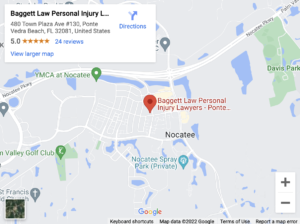
Evidence is any item, including spoken and written words, that make the existence of a fact more or less likely. Evidence doesn’t have to possess enough persuasive power to prove the fact. However, it must comply with the Florida Evidence Code, which restricts the kind of evidence you or the other party can use.
Elements of a Personal Injury Case: What You Have To Prove To Win

Every personal injury claim includes a set of elements that you must prove to win the claim.
For most personal injury claims, you must prove the following four elements of negligence:
- Duty: The defendant owed you a duty of care. This duty varies according to the situation. A doctor owes you a much higher duty of care while treating you than a passerby who renders first aid after a car accident.
- Breach of duty: The defendant acted (or failed to act) in a manner inconsistent with their duty of care toward you. In cases where the defendant is a professional, you might need an expert witness to prove this.
- Damages: You suffered a tangible physical injury (in most cases). You have no personal injury claim if your doctor negligently tells you that you’re terminally ill, even if it scared you to death.
- Causation. The defendant’s breach of duty must have caused your damages in two ways: (i) “cause in fact” means you would not have suffered damages except for the defendant’s misconduct, and (ii) “proximate cause” means that your damages were a foreseeable result of the defendant’s misconduct.
Usually, you must prove each of these four elements by a “preponderance of the evidence” standard. Since you do not have to prove fault to win workers’ compensation or product liability claims, different legal elements apply.
The Standard of Review
The standard of review for most personal injury claims is “a preponderance of the evidence.” All this means is that if evidence were solid and could be weighed, the evidence in your favor would outweigh the evidence in the defendant’s favor, even if only by the weight of a feather.
The “beyond a reasonable doubt” standard does not apply to personal injury claims. Because of this double standard, you can win a personal injury claim even if the defendant has already been acquitted of a crime over the same incident. The intermediate “clear and convincing evidence” standard applies to a claim for punitive damages.
Examples of Evidence in a Personal Injury Claim
Following are some examples of evidence that might help you win your personal injury claim:
- Your medical records to determine your medical expenses.
- Your earnings records to determine your lost earnings.
- Your receipts and bills to determine your out-of-pocket expenses, such as child care.
- The results of an independent medical exam of your injuries.
- Photographs of your injuries, the scene of the accident, etc.
- CCTV images.
- Your social media posts, under certain circumstances.
- Eyewitness testimony. The value of this testimony depends on the credibility of the witness.
- Expert witness testimony. Expert witnesses can offer their professional opinion on a matter within their field of expertise. For example, an expert witness might testify that a “reasonable doctor” would have ordered a C-section under the circumstances that generated the claim.
- Your injury journal, where you detail your pain and how your injury has affected your life.
- The relevant insurance policy, if any.
It surprises many people to learn that a court will usually not allow a lawyer to use a police report as evidence. Instead, the lawyer must subpoena the police officer who wrote the report and question them on the witness stand.
Pretrial Discovery
The pretrial discovery process is a way of gaining access to evidence in the other party’s possession. The discovery process offers several tools that you can use to gather evidence under the other party’s control:
- Depositions, where each side’s lawyer can cross-examine the other side’s witnesses. This cross-examination takes place under oath, typically in a lawyer’s office.
- Interrogatories are written versions of deposition questions that the other side has a longer time to answer. They might require research to answer.
- Demands for production are requests for access to physical evidence and documents in the other party’s possession. For example, your lawyer might seek data from a truck’s event data recorder (“black box”).
- Requests for admissions allow each side to admit facts that the requesting party doesn’t want to bother proving. Requests for admission simplify negotiation and litigation.
All of this additional evidence might produce the evidence you need to gain enough advantage in negotiations to force a settlement without a trial. Remember, however, that the other party can use the discovery process to gather evidence in your possession–an independent medical examination of your injuries, for example.
Schedule a Free Consultation With an Experienced Jacksonville Personal Injury Lawyer
Most personal injury lawyers offer free initial consultations. In fact, with most personal injury lawyers, you’ll never owe a dime unless you win your claim. A skilled Jacksonville personal injury lawyer knows the Florida Evidence Code by heart, and they know which evidence will work and which evidence won’t.
Call us at (904) 396-1100 today or contact us online for your free consultation with one of our Jacksonville personal injury attorneys from Baggett Law Personal Injury Lawyers.




